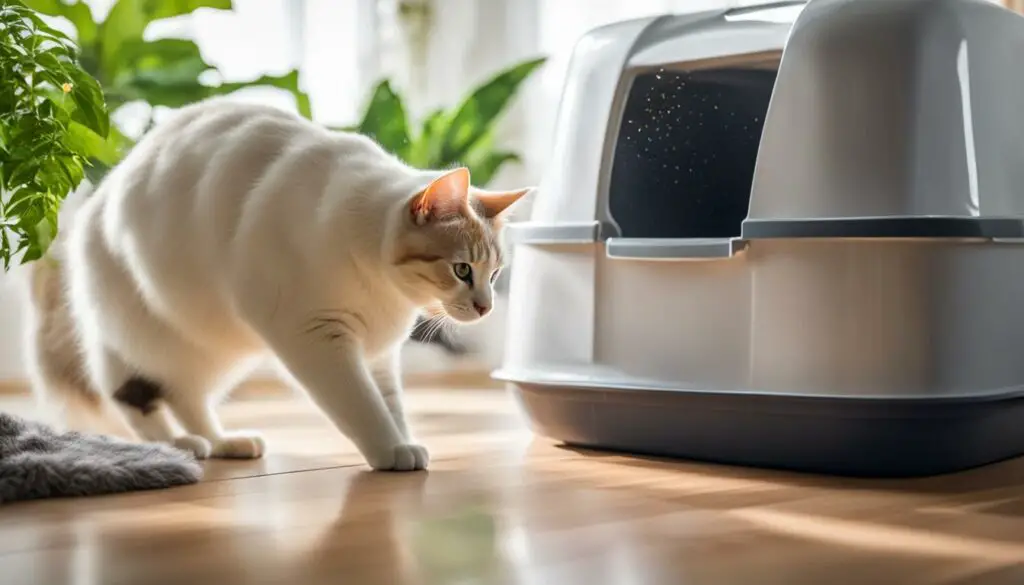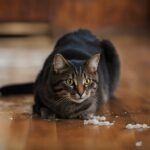I understand how frustrating it can be when your cat won’t stop spraying. Not only is it an unwanted behavior, but it can also disrupt the harmony and peace in your home. But don’t worry, there are effective solutions that can help you address this issue and restore tranquility.
Cat spraying is a common problem faced by many cat owners. It’s important to understand that spraying is different from urinating and is often a way for cats to mark their territory. By understanding the reasons why cats spray, we can find the right strategies to stop this behavior.
There are several factors that can contribute to spraying, including stress, urinary tract infections, mating behavior, marking turf, and litter box issues. By taking corrective steps and implementing the right solutions, you can help your cat overcome spraying and bring peace back to your home.
Key Takeaways:
- Cat spraying is different from urinating and is a way for cats to mark their territory.
- Understanding the reasons behind spraying is essential in finding effective solutions.
- Factors that contribute to spraying include stress, urinary tract infections, mating behavior, marking turf, and litter box issues.
- Implementing stress relief, proper cleaning techniques, spaying/neutering, controlling outdoor access, and addressing litter box issues can help stop spraying.
- If spraying issues persist, seeking veterinary help is recommended.
Understanding Cat Spraying and Urinating
When it comes to dealing with unwanted behaviors in cats, one of the most common issues faced by cat owners is spraying. But what exactly is spraying, and how does it differ from urinating? Understanding the difference is crucial in finding effective solutions to address this behavior.
Spraying is a behavior in which cats mark their territory by leaving small amounts of pungent urine on vertical surfaces. It is a way for cats to communicate with other cats and establish their boundaries. On the other hand, urinating occurs when a cat relieves their bladder on flat surfaces like the floor or a couch cushion.
One of the main reasons cats spray is to mark their territory. They leave their scent behind as a way of claiming an area as their own. On the other hand, urinating is usually due to a need, such as a full bladder. It can also be attributed to litter box issues, such as an unclean or inaccessible litter box.
To better understand this behavior, it’s important to recognize the difference between spraying and urinating and consider the underlying reasons why cats engage in these behaviors. By doing so, we can implement the right strategies and create a harmonious environment for both cats and their owners.
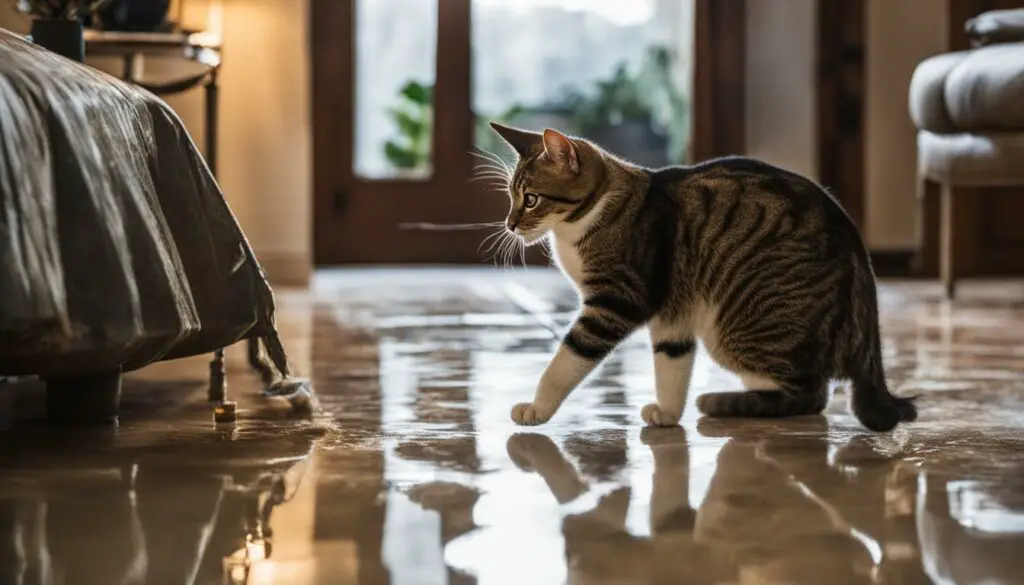
Table: Spraying vs. Urinating
| Spraying | Urinating | |
|---|---|---|
| Behavior | Leaving small amounts of urine on vertical surfaces | Relieving bladder on flat surfaces |
| Purpose | Marking territory and communication with other cats | Relieving a full bladder |
| Causes | Territorial marking, stress, presence of other cats | Litter box issues, full bladder |
| Prevention | Addressing territorial issues, reducing stress | Maintaining a clean litter box, addressing medical issues |
Reasons Why Cats Spray or Mark
Understanding the reasons behind cat spraying or marking behavior is crucial in finding effective solutions. Cats may engage in spraying for various reasons, including stress, urinary tract infections, mating behavior, marking turf, and litter box issues.
Stress can be a significant factor that leads to spraying. Any changes in the household, such as the addition of a new pet or a change in routine, can cause stress in cats and trigger spraying behavior. It’s important to provide a calm and stable environment for your feline friend to help reduce stress and minimize spraying incidents.
Urinary tract infections (UTIs) or other medical issues can also contribute to spraying behavior, especially in male cats. If you suspect that your cat’s spraying is related to a medical problem, it’s essential to consult a veterinarian to address the underlying issue and provide appropriate treatment.
Mating behavior is another common reason for spraying, particularly in unneutered cats. Unneutered male cats may spray to mark their territory and attract potential mates. Having your cat spayed or neutered can help reduce hormone-related spraying behaviors and prevent unwanted litters.
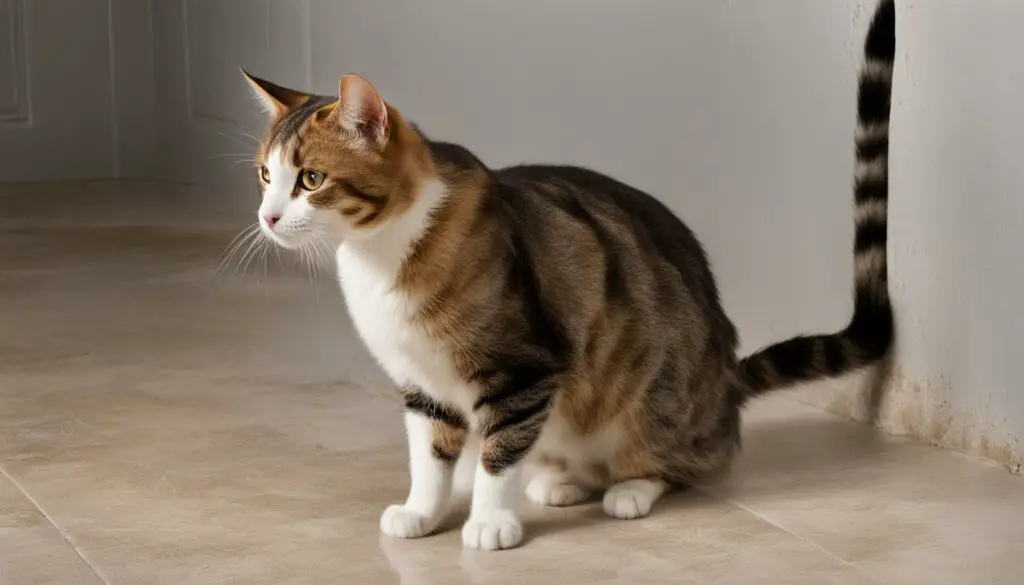
Cats may also spray to mark their territory, especially if they sense the presence of outdoor cats in their environment. Marking turf is a natural instinct for cats and serves as a way for them to establish their boundaries. By addressing the outdoor cat issue and creating a safe and secure space for your cat indoors, you can help diminish spraying incidents.
Litter box issues, such as a change in the type of litter or a dirty litter box, can also contribute to spraying behavior. Cats are inherently clean animals, and if they are not satisfied with their litter box situation, they may choose to spray as a way to communicate their dissatisfaction. Ensuring a clean and comfortable litter box environment is essential in preventing spraying caused by litter box issues.
Table: Reasons for Cat Spraying or Marking
| Reasons for Cat Spraying or Marking |
|---|
| Stress |
| Urinary tract infections |
| Mating behavior |
| Marking turf |
| Litter box issues |
Solutions to Help Stop Cat Spraying
Dealing with a cat that won’t stop spraying can be frustrating, but there are several solutions that can help address this behavior and restore harmony in your home.
1. Stress Relief: Providing stress relief for your cat is crucial in reducing spraying behavior. Spend quality time playing with your cat, offer attention and affection, and create a stimulating environment with toys and scratching posts. This can help alleviate stress and redirect their energy away from spraying.
2. Cleaning: Proper cleaning techniques are essential in eliminating the scent of urine and discouraging your cat from re-marking. Use enzymatic cleaners that can break down the chemicals in cat urine. Additionally, you can try using a vinegar solution to clean the sprayed areas and deter future spraying.
3. Positive Reinforcement: Creating positive associations with the areas where your cat has sprayed can help change their perception. Repurpose the marked spot by turning it into a feeding or play area. By associating positive experiences with the previously marked areas, your cat may be less inclined to spray in those locations.
4. Spaying/Neutering: Getting your cat spayed or neutered is one of the most effective ways to stop spraying behavior. This procedure can help reduce the hormonal changes that contribute to marking and territorial behavior. Consider spaying or neutering your cat, as it not only prevents spraying but also offers other health benefits.
5. Controlling Outdoor Access: If your cat is spraying due to territorial conflicts with outdoor cats, consider limiting their outdoor exposure. Close windows, blinds, or doors to prevent your cat from seeing or smelling other cats. You can also use motion detection devices, like sprinklers, to deter your cat from approaching windows or doors where spraying has occurred.
6. Addressing Litter Box Issues: Make sure your cat’s litter box is clean, easily accessible, and suits their preferences. If your cat is avoiding the litter box or experiencing discomfort while using it, they may resort to spraying. Experiment with different types of litter and keep the litter box in a quiet and private area to encourage regular use.
If despite your best efforts, your cat continues spraying, it’s important to seek veterinary help. A thorough examination can rule out any underlying medical issues that may be contributing to the behavior. Your vet may also recommend behavior medications or suggest additional strategies to address the spraying problem.
By implementing these solutions and being consistent in your approach, you can help stop cat spraying and create a peaceful environment for both you and your feline friend.
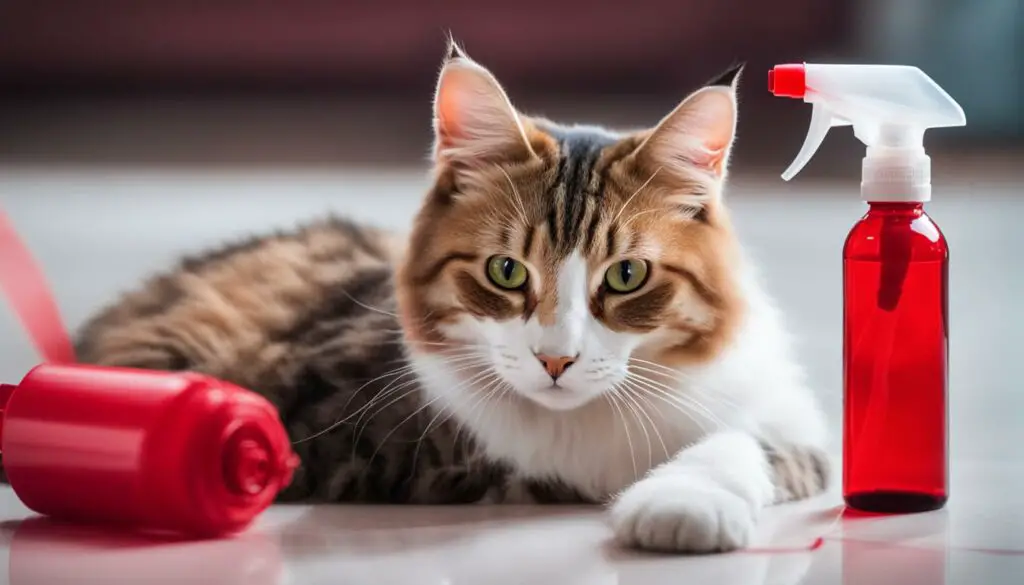
Understanding Cat Behavior and Spraying Triggers
Cats have a territorial nature, and understanding their behavior and spraying triggers can help in finding effective solutions. Stress is a major trigger for spraying behavior in cats. Any changes in the household, such as moving to a new home or the addition of a new family member, can contribute to increased stress levels for cats. It’s important to create a calm and stress-free environment for your cat to minimize spraying.
Changes in routine can also trigger spraying. Cats are creatures of habit, and disruptions to their daily routine can cause stress and anxiety, leading to spraying behavior. It’s important to maintain a consistent routine for your cat and minimize any sudden changes whenever possible.
The presence of neighborhood cats can also trigger spraying. Cats are highly territorial, and the sight or scent of other cats in their environment can stimulate their instinct to mark their territory. Keeping your cat’s outdoor access limited and preventing direct contact with other cats can help reduce spraying behavior.
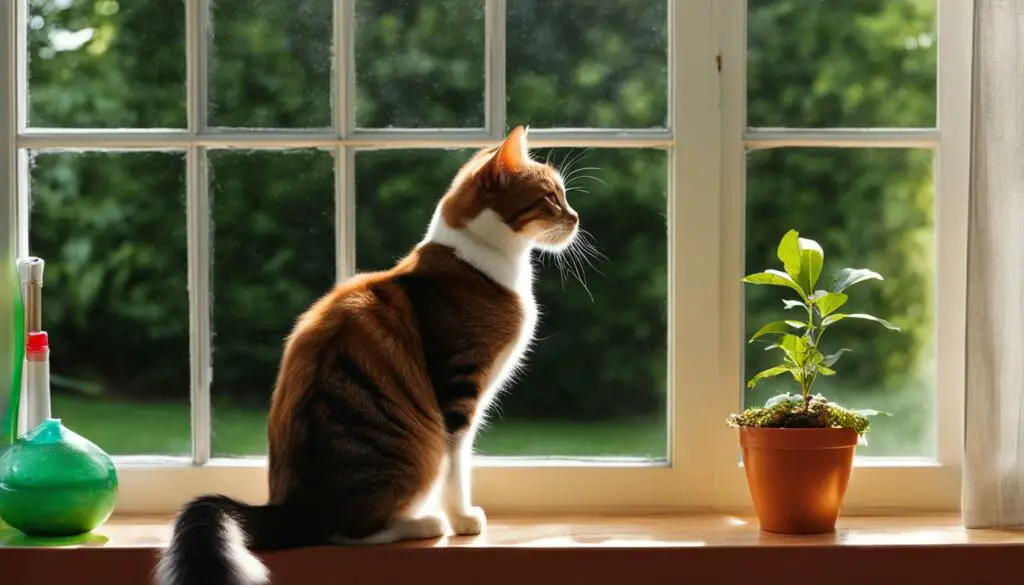
Table: Common Cat Spraying Triggers
| Spraying Trigger | Description |
|---|---|
| Stress | Any changes in the household or routine that cause stress for the cat. |
| Changes in Routine | Disruptions to the cat’s regular schedule or daily activities. |
| Neighborhood Cats | The presence or scent of other cats in the cat’s territory. |
Lastly, changes in litter box arrangements or preferences can also trigger spraying behavior. Cats are highly sensitive to their litter box environment, and any issues with cleanliness, location, or type of litter can lead to spraying. It’s important to provide a clean and easily accessible litter box for your cat and address any litter box issues promptly.
Creating a Stress-Free Environment for Your Cat
Creating a stress-free environment for your cat is crucial in reducing spraying behavior. By implementing a few key strategies, you can help your cat feel more secure and comfortable in their surroundings.
Establishing a routine: Cats thrive on routine, so it’s important to establish a consistent daily schedule. Feed your cat at the same time each day, provide playtime and attention, and maintain a regular sleeping routine. This will help reduce stress and create a sense of predictability for your cat.
Providing a separate space: Cats appreciate having a safe and private space where they can retreat to when they feel overwhelmed. Create a designated area in your home with a cozy bed, blankets, and toys where your cat can relax and unwind. This space should be off-limits to children, guests, and other pets.
Using pheromone sprays: Pheromone sprays, such as Feliway, can help create a calming environment for your cat. These sprays mimic the natural pheromones that cats produce to mark their territory and feel safe. Simply spray the product in areas where your cat spends the most time to help reduce anxiety and stress.
Gradual introductions: When introducing new family members or pets into your home, it’s important to take a gradual approach. Allow your cat to become familiar with their presence slowly. Use scent swapping techniques, where you exchange bedding or toys between your cat and the new addition, to help your cat adjust to the new scent. This gradual introduction will help minimize stress and decrease the likelihood of spraying behavior.

Implementing these strategies will go a long way in creating a stress-free environment for your cat. By reducing stress and anxiety, you can help curb spraying behavior and restore harmony in your home.
Proper Cleaning Techniques for Sprayed Areas
When dealing with a cat that won’t stop spraying, it’s essential to properly clean the sprayed areas to eliminate urine odor and discourage re-marking. Here are some effective cleaning techniques:
Enzymatic Cleaners: These cleaners are specifically designed to break down the chemicals in cat urine and neutralize the odor. They are highly effective in eliminating the scent and discouraging cats from spraying in the same spot again.
Vinegar Solution: Another natural and effective cleaning option is a vinegar solution. Mix equal parts of white vinegar and water and use this solution to clean the sprayed areas. Vinegar helps eliminate the odor and acts as a deterrent for future spraying behavior.
Synthetic Pheromones: Some cleaning products contain synthetic pheromones that mimic the natural calming pheromones produced by cats. These pheromones help create a positive environment and can deter cats from spraying in the treated areas.
“Proper cleaning techniques are important to eliminate the urine odor and discourage re-marking.”
| Cleaning Technique | Effectiveness | Usage |
|---|---|---|
| Enzymatic Cleaners | Highly effective | Apply directly to the sprayed area and follow the instructions on the product |
| Vinegar Solution | Effective | Mix equal parts of white vinegar and water. Apply to the sprayed area and blot with a clean cloth |
| Synthetic Pheromones | Varies depending on the product | Use as directed on the product label |
Remember, thorough cleaning is crucial to eliminate any trace of the urine odor. It’s important to follow the instructions of the cleaning products and repeat the cleaning process if necessary. By using the right cleaning techniques, you can create a fresh and clean environment that discourages your cat from spraying in the same areas.
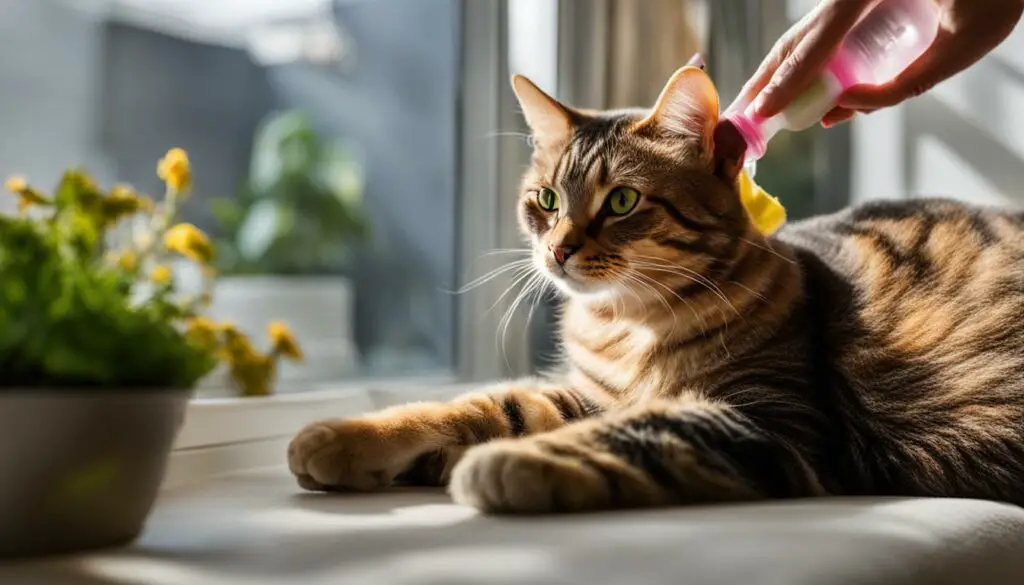
Managing Outdoor Access for Your Cat
When it comes to managing your cat’s outdoor access, it’s important to understand that territorial behavior can often lead to spraying. Limiting your cat’s exposure to the outdoors can help prevent triggers that may contribute to spraying behavior.
One effective way to manage outdoor access is by closing windows, blinds, or doors to prevent your cat from seeing or smelling other cats in the neighborhood. This can help reduce the urge to mark territory through spraying. By creating a barrier between your cat and potential triggers, you can minimize the likelihood of spraying incidents.
In addition to physical barriers, motion detection devices can also be used to deter your cat from approaching windows or doors. Lawn sprinklers, for example, can activate when your cat gets too close, providing a deterrent that can discourage spraying behavior.

Suggested Motion Detection Devices
| Device | Description |
|---|---|
| Outdoor Cat Repellent | A motion-activated device that emits a burst of air or a startling noise when triggered. |
| Ultrasonic Animal Repellent | An electronic device that emits high-frequency sound waves that are uncomfortable for cats |
| Water Sprinkler | A water-based deterrent that activates when motion is detected, spraying water in the direction of the intruder. |
By managing your cat’s outdoor access and implementing effective deterrents, you can help reduce territorial behavior and minimize spraying incidents. Remember to always provide a safe and stimulating indoor environment to ensure your cat’s overall well-being.
Spaying and Neutering: Preventing Cat Spraying
Spaying and neutering play a crucial role in preventing cat spraying behavior. Spraying is often a sign of sexual maturity in cats, and getting them spayed or neutered can help eliminate the hormonal changes that contribute to spraying. This procedure is ideally done before the cat reaches sexual maturity, but even older cats can benefit from it and experience a reduction in spraying behavior.
When a cat is not spayed or neutered, their hormones drive them to mark their territory through spraying. This behavior is more common in unneutered males, but spaying females can also help prevent territorial marking. By removing the reproductive organs, spaying and neutering can significantly reduce the urge to spray and eliminate the pungent odor associated with it.

Spaying and neutering are safe procedures commonly performed by veterinarians. They not only help prevent spraying but also offer other health benefits, such as reducing the risk of certain reproductive cancers. If you have concerns about the procedure, consult with your veterinarian, who can provide guidance and address any questions or concerns you may have.
The Benefits of Spaying and Neutering
Spaying and neutering not only prevent cat spraying but also offer several other benefits for both cats and their owners:
- Reduces the risk of unwanted pregnancies and contributes to controlling the cat population.
- Decreases the likelihood of aggressive behavior, including territorial aggression.
- Helps prevent certain reproductive cancers, such as mammary and testicular cancers.
- Reduces the urge to roam and escape, decreasing the risk of accidents and getting lost.
- Improves overall health and longevity of cats.
By spaying or neutering your cat, you not only address spraying behavior but also promote their well-being and contribute to responsible pet ownership.
Seeking Veterinary Help for Spraying Issues
If your cat’s spraying issues persist despite implementing various strategies, it is crucial to seek veterinary help. A thorough veterinary examination can help rule out any underlying medical issues that may be causing or contributing to spraying behavior. Medical issues such as urinary tract infections or other urinary problems can result in increased frequency of spraying. By addressing these medical issues, you can effectively reduce or eliminate your cat’s spraying behavior.
In some cases, behavior medications may be prescribed to help reduce stress or anxiety that may be triggering spraying. Behavior medications can be a valuable tool in managing spraying behavior, especially in cases where other strategies have not been successful. It’s important to follow veterinary advice and closely monitor your cat’s response to the medications.
Remember, seeking veterinary help is an important step in addressing spraying issues. Your veterinarian can provide expert guidance and tailor a treatment plan specific to your cat’s needs and circumstances. By addressing any underlying medical issues and utilizing behavior medications when necessary, you can help your cat overcome spraying problems and improve their overall well-being.
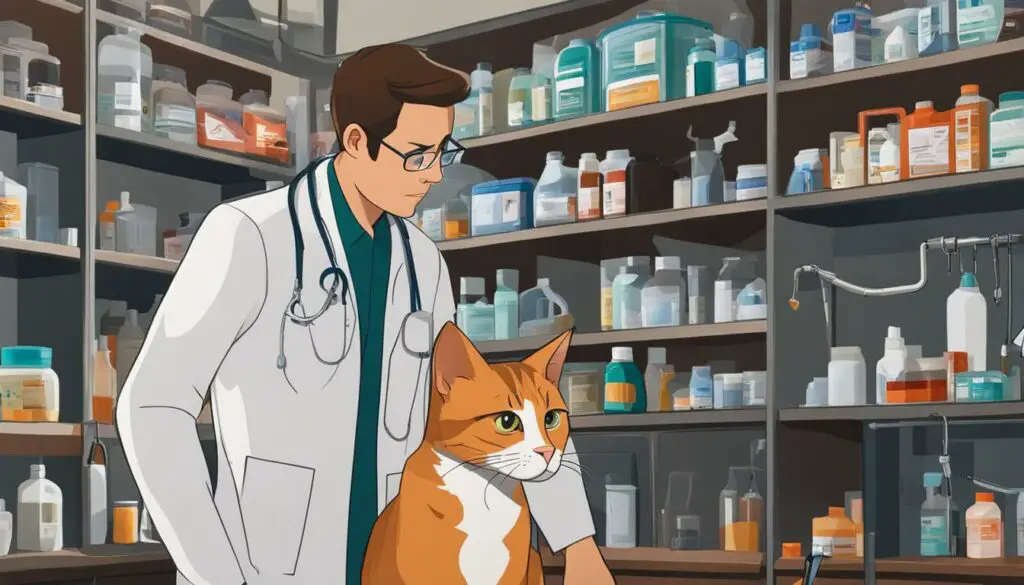
Table: Reasons to Seek Veterinary Help for Spraying Issues
| Reasons | Explanation |
|---|---|
| Medical Issues | Underlying urinary problems or infections can contribute to spraying behavior. |
| Behavior Medications | In cases where other strategies have not been successful, behavior medications may be prescribed to reduce stress and anxiety. |
| Expert Guidance | Your veterinarian can provide tailored advice and treatment plans specific to your cat’s needs. |
The Role of Neutering in Controlling Spraying Behavior
Neutering plays a significant role in controlling spraying behavior in cats. When a cat reaches sexual maturity, hormonal changes occur that can trigger the urge to mark territory through spraying. By getting your cat neutered, you can eliminate these hormonal changes and reduce the likelihood of spraying. This procedure is highly effective in preventing spraying and can be done at any age, even in older cats.
| Benefits of Neutering: | Effects on Spraying Behavior: |
|---|---|
| 1. Prevention of unwanted litters. | 1. Reduction in territorial marking. |
| 2. Decreased risk of certain health issues, such as testicular cancer and uterine infections. | 2. Decreased aggression, which can contribute to spraying behaviors. |
| 3. Improved overall behavior and temperament. | 3. Reduction in the pungent odor associated with spraying. |
Neutering not only helps control spraying behavior but also offers numerous other benefits for your cat’s health and well-being. By eliminating the risk of unwanted litters and reducing the chance of certain health issues, you are ensuring a better quality of life for your furry friend. Additionally, neutering can help decrease aggression and improve your cat’s overall behavior and temperament.
It’s important to note that neutering alone may not completely eliminate spraying behavior in all cases. There may be underlying factors such as stress or territorial conflicts that need to be addressed as well. However, neutering is an essential step in controlling spraying and creating a harmonious environment for both you and your cat.

The Importance of Consistency in Behavior Modification
Consistency is a crucial factor when it comes to behavior modification in cats. It is important to establish consistent routines and reinforce desired behaviors to effectively address spraying. Positive reinforcement is a more effective method than punishment in encouraging desired behaviors and reducing spraying tendencies. Instead of scolding or punishing your cat, focus on providing rewards and praise when they exhibit appropriate behavior. This approach creates a positive environment and encourages your cat to repeat the desired actions.
Behavior modification requires patience and persistence. Consistency in implementing strategies such as providing stress relief, addressing litter box issues, and managing outdoor access is key to success. By consistently following these strategies, you can create a stable and predictable environment that helps reduce stress and minimize spraying behavior.
It is important to note that cats do not respond well to punishment or scolding. These methods can increase stress and fear, leading to further behavioral issues. Instead, focus on positive reinforcement, rewarding your cat when they use the litter box appropriately or exhibit other desired behaviors. Consistency in providing positive experiences and rewards can help modify your cat’s behavior over time.
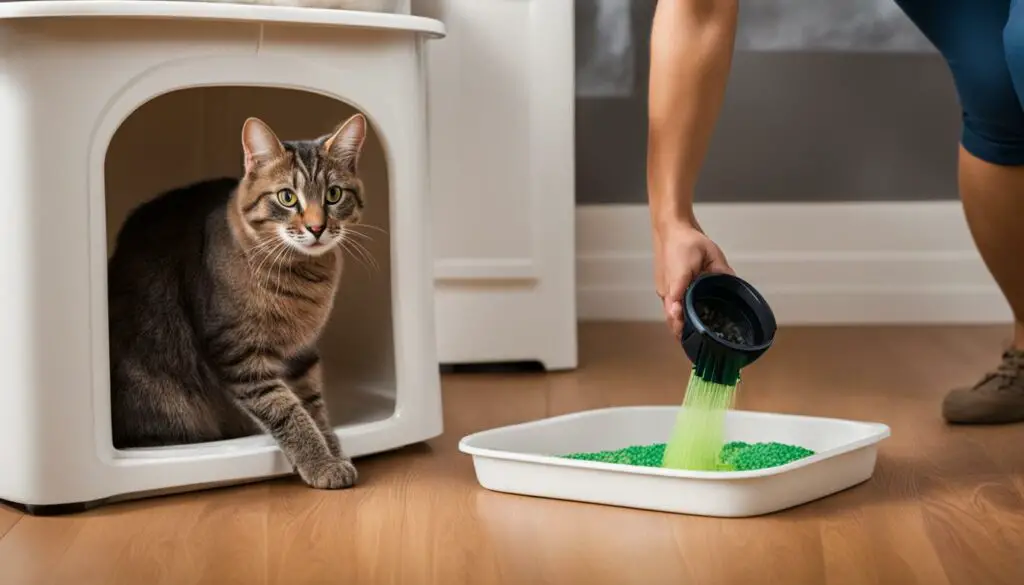
Quotes:
“Consistency is key when it comes to behavior modification in cats. Positive reinforcement is more effective than punishment in encouraging desired behaviors and reducing spraying.”
“Cats do not respond well to scolding or punishment, which can lead to increased stress and fear.”
Summary:
In summary, consistency plays a vital role in behavior modification for cats that spray. By establishing consistent routines, practicing positive reinforcement, and avoiding punishment or scolding, you can create a positive environment that encourages desired behaviors and reduces spraying tendencies. Remember to be patient and persistent in your efforts, as behavior modification takes time. By consistently implementing these strategies, you can effectively modify your cat’s behavior and restore peace in your home.
Conclusion
Dealing with a cat that won’t stop spraying can be challenging, but with the right understanding and strategies, it can be resolved. By addressing the underlying causes of spraying and implementing effective solutions, you can restore peace in your home.
Understanding your cat’s behavior and the triggers for spraying is crucial. Cats spray to mark their territory, communicate with other cats, and relieve stress. By creating a stress-free environment, maintaining a consistent routine, and providing proper cleaning techniques, you can help reduce spraying behavior.
Managing your cat’s outdoor access, considering spaying/neutering, and seeking veterinary help when necessary are also important steps in stopping cat spraying. Spaying or neutering your cat helps control hormonal changes and reduce the urge to mark territory. Veterinary guidance can be valuable in identifying and addressing any underlying medical issues or prescribing behavior medications if needed.
Remember, consistency in behavior modification is key. Use positive reinforcement and avoid scolding or punishment, as these can increase stress and fear in your cat. With patience and a holistic approach, you can help your cat overcome spraying behavior and create a harmonious environment in your home.
FAQ
What is the difference between cat spraying and urinating?
Cat spraying is when cats mark their territory by leaving small amounts of pungent urine on vertical surfaces. Urinating, on the other hand, occurs when a cat relieves their bladder on flat surfaces like the floor or a couch cushion.
Why do cats spray or mark their territory?
Cats may spray or mark their territory due to stress, urinary tract infections, mating behavior, marking turf, or litter box issues.
How can I stop my cat from spraying?
There are several solutions to help stop cat spraying, including providing stress relief, cleaning sprayed areas, creating positive associations, getting your cat spayed or neutered, controlling outdoor access, addressing litter box issues, and seeking veterinary help if needed.
What are some common triggers for cat spraying?
Common triggers for cat spraying include stress, changes in routine, the presence of neighborhood cats, and changes in the litter box.
How can I create a stress-free environment for my cat?
Creating a stress-free environment for your cat involves establishing a routine, providing a separate space, using pheromone sprays, and taking gradual approaches to introductions.
What are some effective cleaning techniques for sprayed areas?
Effective cleaning techniques for sprayed areas include using enzymatic cleaners, vinegar solutions, and synthetic pheromones to eliminate the urine odor and discourage re-marking.
How can I manage my cat’s outdoor access to prevent spraying?
Limiting your cat’s outdoor exposure by closing windows, blinds, or doors can prevent them from seeing or smelling other cats that may trigger spraying. Motion detection devices, such as lawn sprinklers, can also deter them from approaching windows or doors.
Does spaying or neutering help prevent spraying behavior?
Yes, spaying or neutering your cat is a highly effective way to prevent spraying behavior. It helps reduce the hormonal changes associated with sexual maturity and the urge to mark territory through spraying.
When should I seek veterinary help for spraying issues?
If spraying issues persist despite implementing various strategies, it’s important to seek veterinary help. A thorough examination can rule out any underlying medical issues that may be causing or contributing to spraying behavior.
How does neutering play a role in controlling spraying behavior?
Neutering helps reduce the hormonal changes associated with sexual maturity, which in turn reduces the urge to mark territory through spraying. It can also help reduce aggression in cats, which can contribute to spraying behaviors.
Why is consistency important in behavior modification for cats?
Consistency is important in behavior modification for cats because positive reinforcement is more effective than punishment. Cats respond better to consistent reinforcement and rewards for desired behaviors, creating a positive environment and discouraging spraying.

